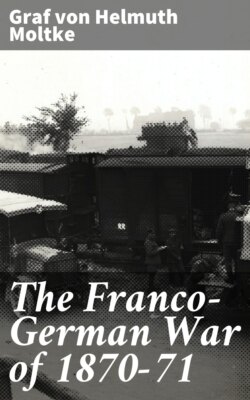Читать книгу The Franco-German War of 1870-71 - Graf von Helmuth Moltke - Страница 8
На сайте Литреса книга снята с продажи.
Оглавление(August 4th.)
On this day the Corps of the IIIrd Army, consisting of 128 battalions, 102 squadrons, and 80 batteries, which had been assembled in bivouac behind the Klingsbach, crossed the French frontier, marching on a broad front to reach the Lauter between Weissenburg and Lauterburg. This stream affords an exceptionally strong defensive position, but on August 4th only one weak Division and a cavalry brigade of the Ist French Corps covered this point, the main body of that Corps being still on the march towards the Palatinate.
Early in the morning the Bavarians forming the right wing encountered a lively resistance before the walls of Weissenburg, which were too strong to be stormed. But very soon after the two Prussian Corps crossed the Lauter lower down. General von Bose led forward the XIth Corps (which he commanded) with intent to turn the French right flank on the Geisberg, while General von Kirchbach, with the Vth Corps (which he commanded) advanced against the enemy's front. Thirty field-guns were meanwhile massed against the railway station of Weissenburg. It and subsequently the town were taken, after a bloody struggle.
So early as ten o'clock General Douay had ordered a retreat, which was seriously threatened by the movement against the Geisburg; and the château of that name, a very defensible building, was most obstinately defended to enable the French to retire. The Grenadiers of the King's Regiment No. 7 in vain assailed it by storm, suffering heavy loss; nor did its defenders surrender until, with the greatest difficulty, artillery had been dragged up on to the height.
The French Division, which had been attacked by three German Corps, effected a retreat after an obstinate struggle, though in great disorder, having suffered much loss. Its gallant Commander had been killed. The Germans had to bewail a proportionately considerable loss; their casualties were 91 officers and 1460 men. General von Kirchbach had been wounded while fighting in the foremost rank.
The 4th Division of cavalry had met with much delay in the course of a nineteen miles' march by the crossing of the columns of infantry. It did not reach the scene of combat, and all touch of the enemy, now retiring to the westward, was lost.
Uncertain as to the direction whence fresh hostile forces might be approaching, the IIIrd Army advanced on the 5th of August by diverging roads in the direction of Hagenau and Reichshofen; yet not so far apart but that it should be possible for the Corps to reconcentrate in one short march. The Crown Prince intended to allow his troops a rest on the following day, so as to have them fresh for a renewed attack as soon as the situation was made clear.
But already, that same evening, the Bavarians on the right flank and the Vth Corps in the front had a sharp encounter with the enemy, who showed behind the Sauer in considerable strength. It was to be assumed that Marshal MacMahon had brought up the VIIth Corps from Strasburg, but it remained a question whether he intended to join Marshal Bazaine by way of Bitsch, or whether, having secured his line of retreat thither, he meant to accept battle at Wörth. Yet again there was the possibility that he might himself initiate the offensive. The Crown Prince, to make sure in any case of a preponderance of force, determined to concentrate his army in the neighbourhood of Sulz on August 6th. The IInd Bavarian Corps received separate instructions to watch the road from Bitsch with one Division; the other Division was to strike the hostile attack in flank on the western bank of the Sauer, in the event of artillery fire about Wörth being heard.
Marshal MacMahon was endeavouring with all his might to concentrate his three Corps, and he really had the intention to make an immediate attack on his invading foe. A Division of the VIIth Corps, which had but just been sent to Mülhausen to strengthen the defence of Alsace, was at once recalled to Hagenau, and early on the 6th formed the right wing of the strong position which the Ist Corps had taken up behind the Sauer, and in front of Fröschwiller, Elsasshausen, and Eberbach. On the left, Lespart's Division of the Vth Corps was expected from Bitsch, of which the other Divisions were only now on march from Saargemünd by way of Rohrbach. Meanwhile Ducrot's Division formed a refused flank on the French left.
Neither the German nor the French leaders expected the collision before the following day, but when, as in this case, the adversaries are in so close proximity, the conflict may break out at any moment, even against the wish of the higher commanders.
